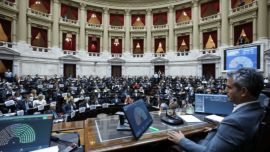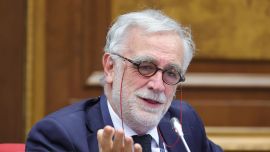The provincial government of Chubut, in southern Patagonia, decreed on Wednesday that it will expel foreigners who commit crimes from its territory and prevent the entry of those with a criminal record.
Article 1 of the decree, signed by Peronist Governor Mariano Arcioni, orders the Ministry of Government "to carry out measures leading to expulsion and prohibition of entry into the province of Chubut" of "foreign citizens who have been convicted of or are serving a criminal sentence, [or] who have a criminal record or non-final conviction for crimes committed in the Argentine Republic or abroad."
"The decree provides for the expulsion of foreigners who are serving sentences or not firm sentences. It also prohibits the entry into Chubut of foreigners who have a [criminal] background," Chubut government minister Federico Massoni said in comments delivered to the TN channel.
The official justified the measure by saying there had been an increase of the number of foreigners entering the province "in the last six months," mostly from "Venezuela, Colombia, Paraguay and Bolivia," he said. He said the province, located some 1,300 kilometres south of Buenos Aires, had witnessed an increase in the amount of crimes over the same period.
Massoni explained that he instructed police to carry out "an exhaustive search of all entries [into the province] made by private vehicles and travelling passengers on National Routes 40 and 3," the two main points of entry into the province's territory.
"It is shown that the increase in the number of crimes is related to the presence in the territory of foreign citizens, Chubut we can not allow imported crime or any kind in our territory," said the official.
The measure was considered with dismay by some experts, including constitutional specialist Andrés Gil Domínguez who suggested the move was unconstitutional.
"The expulsion of convicted foreigners in Chubut, to send them to other provinces, implies ignoring our federal system and the powers of a central government," he said.
Chubut has approximately 560,000 inhabitants. Its economy is based on the exploitation of hydrocarbons, mining, tourism and livestock.
- TIMES/AFP























Comments